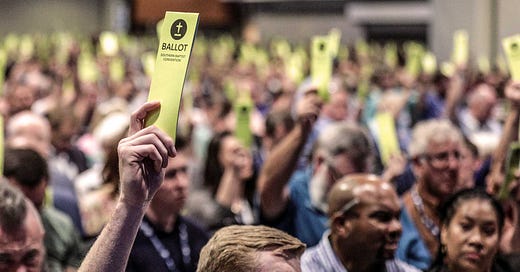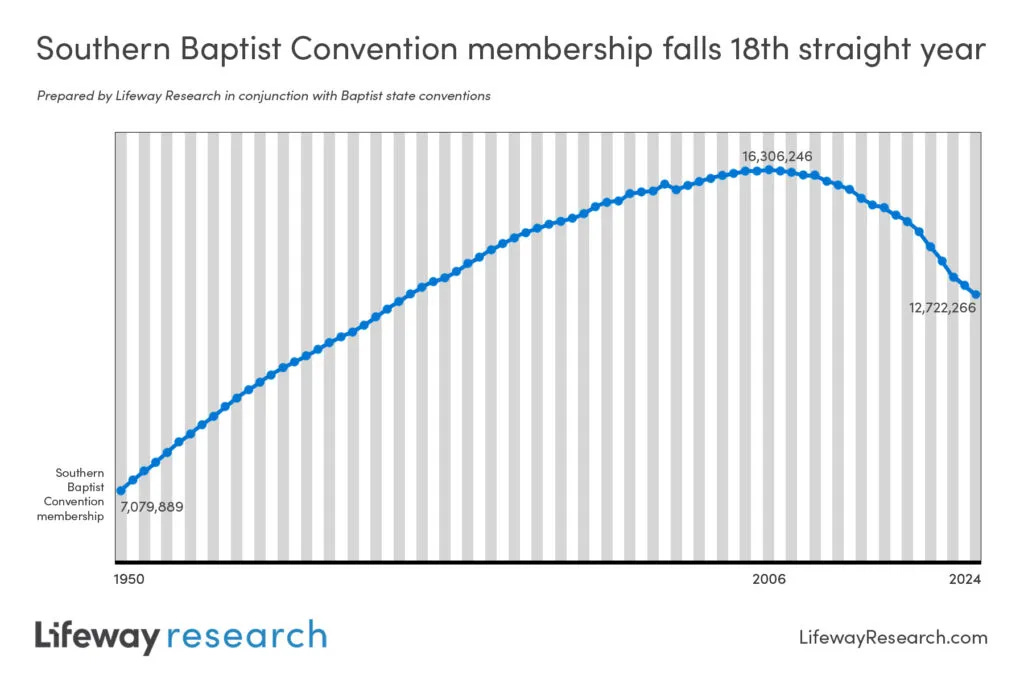The Southern Baptist Convention—the nation’s largest Protestant denomination—held its annual meeting this week in Dallas, Texas at the Kay Baily Hutchinson Convention Center. About 10,500 messengers (our name for delegates from local churches) attended the two-day event, representing the denomination’s 12.7 million members and 46,876 churches.
I’ve attended several of these annual meetings and they follow a similar pattern of worship, prayer, sermons, reports, debates, votes and elections. Think of it as a mashup of old time revival, town hall meeting, political rally and local church business conference—all packaged in an upscale venue.
Over the last few years the SBC has faced several significant crises, and many of them came to the surface at this convention. In this post I’ll first discuss how the messengers dealt with present issues. Second, I’ll take a look at future challenges that the convention didn’t deal with but in my judgment need to be addressed soon. My sense of the convention as a whole is that it attempted to restore some sense of stability and normalcy after the scandals and crises of the last few years. Time will tell if it succeeded.
Present Issues
The Budget
The first and most pressing challenge facing the convention was the budget. With contributions to the denomination declining, the Executive Committee proposed a total budget of $190 million, a figure that included $3 million for covering unexpected costs of the sexual abuse investigations that have been on-going for the last three years (more on that below). The $3 million is on top of the $12 million that the EC has already spent on the sex abuse investigations, with no end in sight. The convention voted by a wide margin to adopt the proposed budget as presented.
Women Pastors
SBC conventions have been roiled in the last few years by the issue of women pastors—not only women who serve as senior pastors but any woman on a church staff with the title of “pastor” in her job description. This year’s convention continued the trend with a motion being made to change our bylaws to exclude from fellowship any SBC church that includes women pastors on its staff. The motion failed to reach the two-thirds majority necessary for a bylaws change, leaving the current bylaws in effect.
The Ethics and Religious Liberty Commission
The ERLC, the SBC’s lobbying agency in Washington DC, has been a thorn in the side of the more conservative branch of the SBC for decades. Claiming that the commission is too liberal in its theology, many leaders down through the years have advocated for radical change in the ERLC or closing it down altogether. Those voices reached a crescendo this year as the agency was accused of accepting donaations from progressive advocacy groups. A motion to eliminate the ERLC was made at the convention but failed.
Financial Transparency from Agencies
The final major issue the convention faced was a motion regarding financial transparency in our agencies. Erik Smith, a messenger from Cannon Baptist Church in Georgia, brought a motion that all SBC entities publish the same detailed financial information as do other non-profits, using the IRS 990 form “that shows executive compensation, major expenses and financial details.” What lay behind Smith’s motion was the practice of all SBC agencies not to release those details. After impassioned comments from EC President Jeff Iorg in defending the agencies, the convention voted down the motion.
The Sex Abuse Database.
After years of critical news stories, internal study and public discussion, the SBC in 2022 began a sex abuse hotline for victims of clergy sexual abuse. Guidepost Solutions, a third party agency, was hired by the Executive Committee to administer the hotline, investigate the claims and create a database of Southern Baptist clergy convicted of sexual crimes. The hotline has had some response, but the national data base has stalled to the point where the Executive Committee recently acknowledged that it is no longer a priority. While the convention took no action regarding the database, its shadow lies over the EC and the SBC as a whole. The perception in many quarters is that our denomination doesn’t care enough about women abused by our pastors to do anything about it.
My takeaway from the issues considered by the convention is that it sought to find a common center, to course correct from the extremes of previous years. That’s my read on the defeat of the women pastor issue as well as the failure of the ERLC motion. In both cases, the convention chose not to rock the boat and to leave the status quo in place. The unspoken aim was to keep the circle of cooperation as large as possible.
The same principle holds true, I think, when it came to approving the budget and establishing some sort of financial transparency. Both situations were resolved by defaulting to institutional priorities. No other explanation makes sense to me, especially regarding the transparency issue. It beggars belief that a nonprofit would think that it could succeed in raising money when it hides executive salaries and other expenses from the people who contribute to it. But in SBC life secrecy has been the norm when it comes to those matters. We’ll see how long the practice can continue in a time when distrust of institutions is at an all time high.
Future Challenges
Beyond the SBC’s present issues that the convention addressed, there are several challenges on the horizon that it must come to terms with but hasn’t yet figured out how. I believe they’ll have a greater impact on the future success of the denomination than the more visible issues that this week’s convention addressed.
Numerical decline
Here’s a graph of SBC membership since 1950 prepared by our own Lifeway Research.
While some recent statistics are positive—baptisms and worship attendance have improved each of the last four years—the overall loss of members that the graph makes clear along with the closing of churches (we’re losing over 1000 churches a year) are concerning. There isn’t a simple explanation for our decline, but the overall trend is something that must be addressed before it reaches crisis levels. Indeed, losses on this scale may already be at crisis levels.
Our reputation with women
I mentioned in the first section of this post two issues at the convention that impacted women. The first was our inability or unwillingness to competently provide the sex abuse data base that our leaders had previously promised. Whatever the reasons, the message sent was that the SBC doesn’t think the matter is important. That’s a hard perception to overcome.
The second issue was our policy and practice regarding women serving as pastors. While there are important biblical principles at stake, the way the topic has come across to many women is that our denomination doesn’t value them. When added to the sex abuse data base debacle, it’s a terrible look for the SBC in many quarters.
The centralization of power
Today, we’re seeing the inexorable drive toward a centralized authority structure within the SBC. We have a centralized funding mechanism called the Cooperative Program. We have a centralized bureaucracy called the Executive Committee overseeing the system. We have an expectation of centralized support for all the centralized agencies. We have a centralized creed called the Baptist Faith and Message 2000 that a centralized group called the Credentials Committee is expected to use in order to keep unruly churches in line. For a denomination cobbled together from small churches with a common passion for the gospel and a shared love of freedom, the drive to invest power in a small circle who will tell us what to do, how to do it and who we can do it with is a far reach.
A broken trustee system
It’s a mistake to say that the modern SBC is bound together by our passion for missions. While the statement may be true in a philosophical sense, it’s clearly not the case when it comes to functionality. In the way our denomination operates, the SBC is defined by its institutions or agencies.
Our two missions boards, the International Mission Board and the North American Mission Board, are our two most prominent institutions but there are many more. Six seminaries are scattered from coast to coast. Guidestone provides for our ministers’ and other workers’ retirement and insurance needs. Lifeway publishes much of our teaching material. The Ethics and Religious Liberties Commission lobbies Congress on behalf of our doctrinal convictions. Then there’s the Executive Committee, the institution that coordinates the work of all the other institutions.
For each institution there is a board of trustees elected by the convention to provide oversight. To the tune of a total of 500 trustees charged with the responsibility of ensuring that our institutions carry out their mission according to the wishes of the convention. At least, that’s the theory. Things can be different in practice, with trustee positions often awarded on the basis of friendship and institutional leadership not always being forthcoming with the trustees. To the point where Southern Baptist history has many examples of trustees of our institutions not doing their jobs. You can read more about the problems in our trustee system in a previous post.
The Southern Baptist Convention has a unique passion for missions and the evangelism and plays a vital role in gospel ministry around the world. If it’s able to meet the challenges that lie before it, the future may be as bright as the past. If not, the numerical decline will continue to the point where we’ll find ourselves included in the growing list of denominations that no longer matter.






Thank you for this summary of the the issues dealt with and not dealt with at the SBC Convention. I hope you’re right that the SBC may be able to have a bright future. I grew up a Southern Baptist and still go to a Southern Baptist church (though our church doesn’t flaunt the relationship), but I’ve been so disturbed and saddened over things that have come to light in recent years, especially the sex abuse scandal. I’m afraid the denomination has a long way to go in dealing with that. And despite being a conservative, I don’t like what appears to be a contingent that’s far too comfortable with the political direction so many who would call themselves conservative Christians have taken.
Thank you for the update. 👍🏼⛪ 🔔 🇺🇲 ✝️ 📖
The Sooner State is saturated with Southern Baptist dogma and congregations. We were raised up into the tradition whether we were aware of it or not. Glad to hear that some of the issues are being addressed. Women are always an absolutely critical part of any congregation but glad to see that ordination is not part of their call in the SBC. Women play a vital role in the faithful life of the community and the Church just cannot function without them.